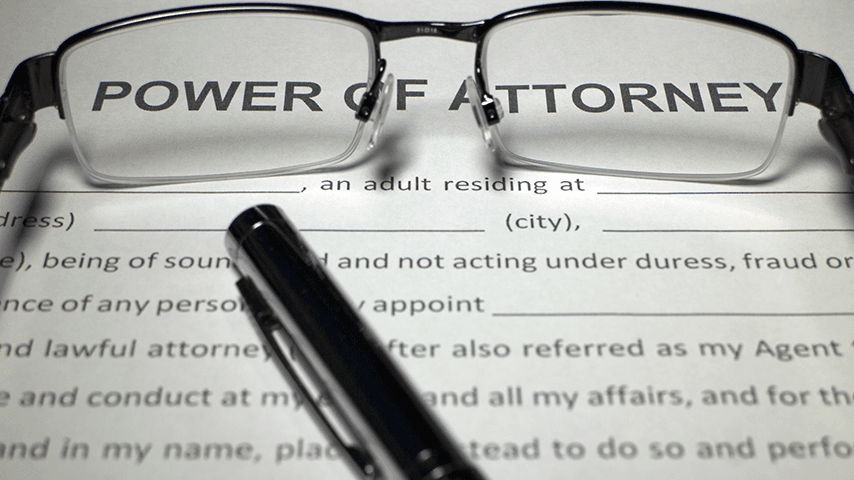What Is Power of Attorney? Types, Uses, and When You Need One
7 min read

Related Topics
One key factor in aging well is planning ahead—especially when it comes to managing your health, finances, and legal matters. Whether you're preparing for your own future or helping a family member navigate theirs, a power of attorney (POA) is an estate planning tool you should know about.
What is a power of attorney?
A power of attorney is a legal document that gives someone else the authority to act on your behalf in certain matters. This person is known as your “agent.”
Depending on the type of POA, your agent might get involved in managing your finances and handling legal affairs. When a POA is used as part of advance care planning, that person may take over your medical decisions if you have diminished mental capacity due to dementia, a traumatic brain injury, or other condition.
POAs can be general, covering many areas. Or they might be specific and limit an agent’s authority to certain tasks.
“I’m just trying to hit home that an advance directive is not something exclusively for old folks,” Zorba Paster, MD, a Wisconsin-based physician, told Wisconsin Public Radio. “Everyone should have one, just like everyone should have a will—and maybe an extra set of keys you hide under that potted plant in case you get locked out of the house. It’s good planning.”
What is a durable power of attorney?
A durable power of attorney is a type of POA that remains in effect even if you become incapacitated. That means your chosen agent can continue making decisions for you if you can no longer make them yourself due to illness, injury, or cognitive decline (e.g., dementia, stroke). Having a durable POA in place can help eliminate the time and expense of a court-appointed guardianship.
A durable POA is different from a non-durable POA, which becomes invalid if you suffer a serious decline in health or cognition.
What does a power of attorney allow someone to do?
A power of attorney gives your chosen agent the legal authority to act on your behalf in specific ways. These might include:
- Financial matters like paying bills, managing investments, handling business transactions, selling property, or applying for Medicaid assistance
- Legal matters such as signing contracts and dealing with insurance companies
- Medical decisions (with a medical POA) including those related to treatment options, surgeries, nursing home care, or end-of-life care
For example, if you’re in the hospital after surgery and can’t pay your household bills, your agent can step in and manage that for you until you’ve returned home. They can even sign checks.
It’s important to understand that having power of attorney doesn’t give someone unlimited power. In the POA document, you can specify exactly what your agent can and cannot do on your behalf. For instance, you may give them access to your checking and savings accounts but not allow them to sell your property.
What are the types of power of attorney?
There are several types of POA. Each serves a different purpose and offers different levels of control to the agent.
Below is a breakdown of the most common types of power of attorney:
- General power of attorney: This gives your agent broad authority to act on your behalf in many matters—financial, legal, or property-related. It’s often used for short-term needs (e.g., when you’re traveling) and becomes invalid if you become incapacitated in some way.
- Durable power of attorney: As mentioned earlier, a durable POA is similar to a general POA, but continues even if you lose the ability to make decisions for yourself. This is a good option for older adults because it helps ensure continuity in the event of health changes.
- Medical power of attorney: A medical POA (also called a health care POA or an advance directive) gives someone (your “proxy”) the authority to make health care decisions for you if you can’t communicate your wishes. A medical power of attorney can cover medical care and treatments, long-term care decisions, and even end-of-life care preferences.
- Financial power of attorney: This type of POA focuses on money matters like managing bank accounts, paying bills, filing taxes, handling investments, or buying/selling real estate. A financial POA may be needed if you become incapacitated or if you're unable to manage your finances for another reason.
- Springing power of attorney: True to its name, this type of POA “springs” into action under certain conditions, such as when you become mentally incapacitated. You define the trigger in your POA document, such as when your doctor declares you unable to make sound decisions based on your health condition.
What does it mean when a POA is revoked?
You can revoke (terminate) a power of attorney document at any time, as long as you're mentally capable of making this decision. POAs also expire automatically upon death, meaning your agent can’t act on your behalf after you pass away. At that point, your will or estate plan takes over.
Who is the best person to choose for power of attorney?
Choosing the right person is just as important as drafting the POA document itself. When selecting someone to act as your agent, make sure they are:
- Someone you trust completely (like a good friend or close relative)
- Responsible and organized
- Familiar with your wishes and values
- Comfortable making important decisions under pressure
- Able to communicate clearly with doctors, financial professionals, or (other) family members
Keep in mind that agents have legal responsibilities. Yours is obligated to act in your best interest; if they misuse their authority, they can be held accountable. That’s why it’s critical to choose your agent carefully.
If you grant power of attorney to a family member, keep family dynamics in mind. To avoid conflict, talk with the rest of your family about your decision and why you chose that particular person.
What is the best way to set up a power of attorney?
Creating a POA doesn’t have to be stressful or complicated. Here’s a quick overview of how to do it:
- Decide what type of POA you need: Do you need financial, medical, durable, or a combination? For example, some older adults have both a medical POA and a durable POA to cover all their bases.
- Choose your agent: As we covered earlier, be sure you’re thoughtful in the person you select. Don’t rush (or be pressured) into a decision.
- Find the right forms: Many states provide standardized POA forms online, or you can get them from an attorney or legal aid office.
- Fill out the paperwork: Be clear about what types of authority you’re granting to your agent. This can help avoid confusion later.
- Sign and notarize: Most states require you to sign the POA document in front of a notary public and witnesses.
- Share copies: Give copies of your POA to your agent, attorney, health care provider (if it’s a medical POA), and any family members who should be kept in the loop. And of course, keep a copy for yourself.
- Talk to an attorney: A legal professional will look at your POA with a critical eye to help ensure it’s valid and aligned with your needs.
Laws related to power of attorney vary by state, so always check local requirements or consult a lawyer who is familiar with elder law.
Frequently asked questions
Can I change my power of attorney?
Yes. As long as you’re mentally able, you can change or cancel your power of attorney at any time.
What is durable power of attorney vs. medical power of attorney?
A durable POA covers financial and legal matters and remains active even if you become incapacitated, while a medical POA only covers health care decisions and goes into effect if you’re unable to speak for yourself.
Does power of attorney expire?
All types of power of attorney automatically expire when you, the principal, pass away. At that point, authority shifts to the executor or personal representative named in your will (or appointed by the court if no will exists).
A POA can also be terminated if you revoke it, or if a predetermined expiration date is reached.


